
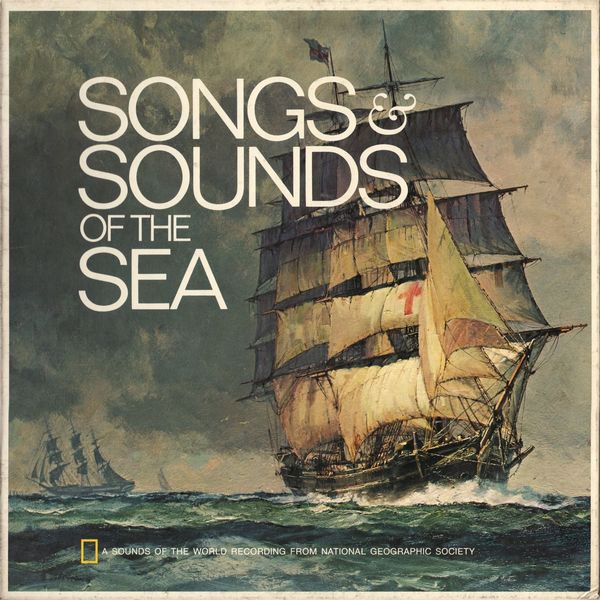 |
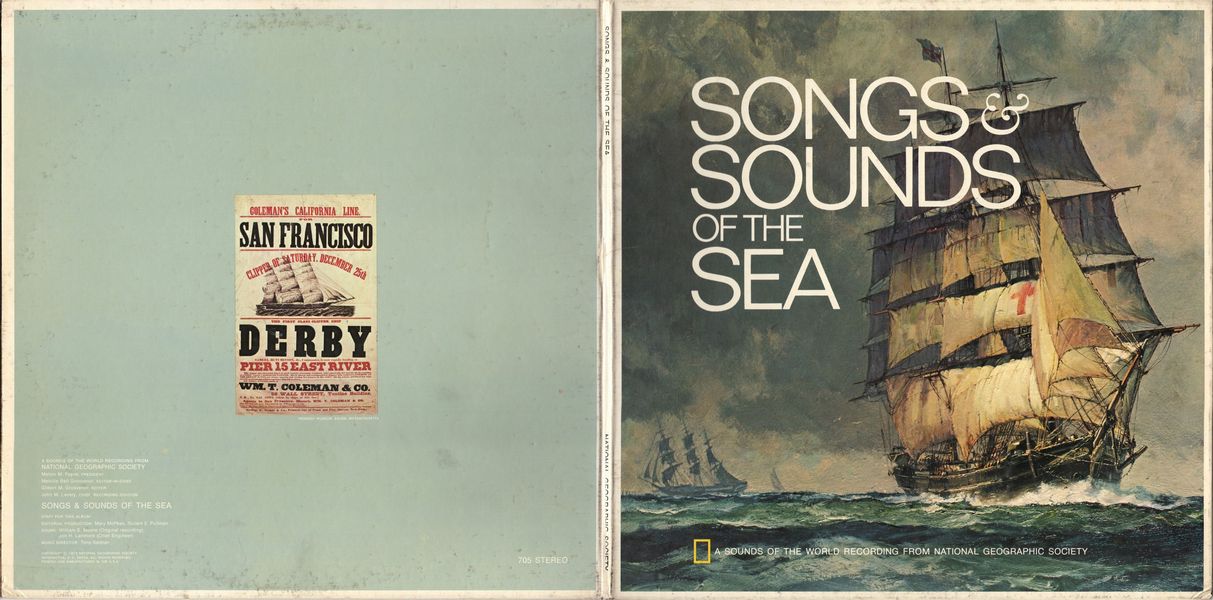
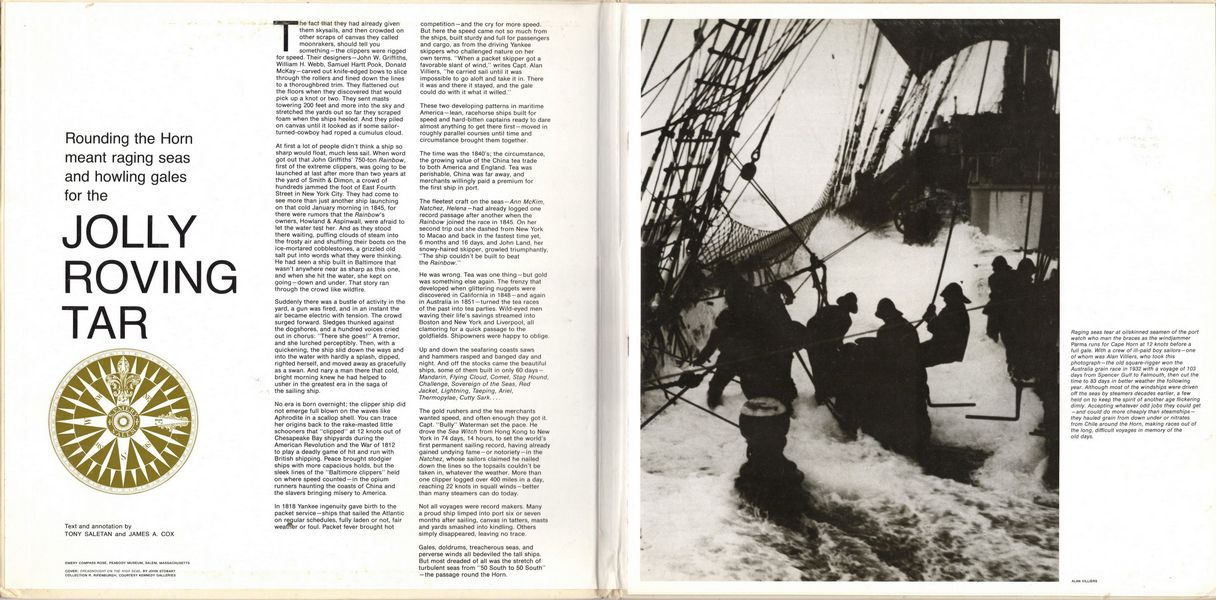
|
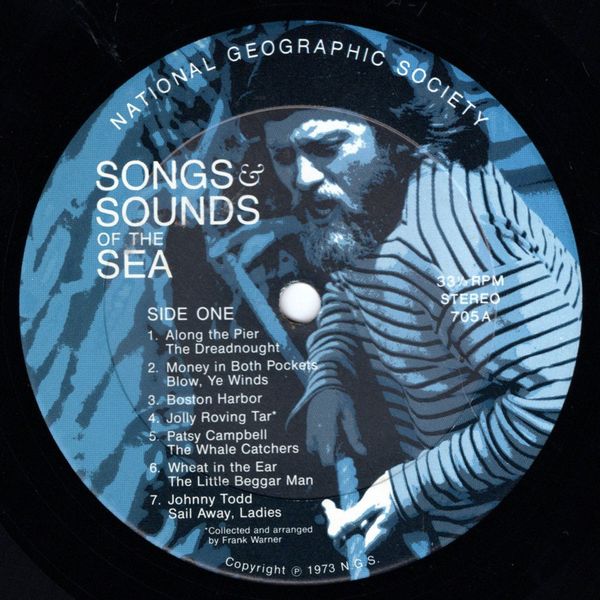
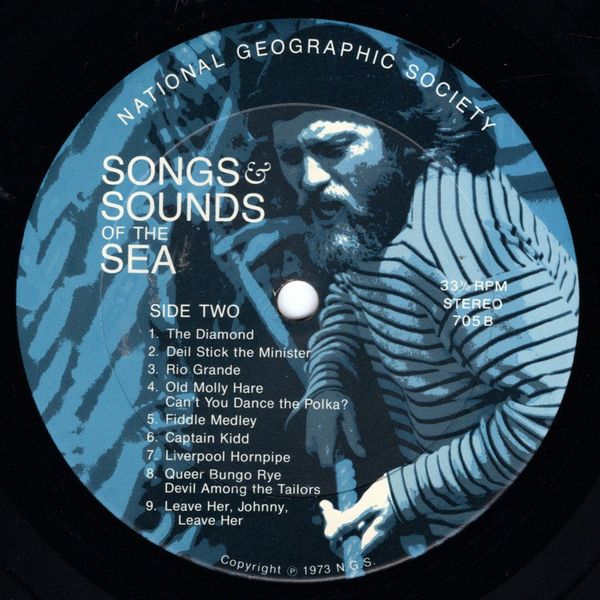
|
| more images |
Sleeve Notes
White sails gleaming, the Shenandoah slices through calm North Atlantic seas off the coast of New England while Louis Killen, Joe Hickerson, Tony Barrand, Tony Saletan, David Jones, and Cliff Haslam absorb atmosphere for the songs they will sing and record later on deck and in the ship's main saloon. Built expressly for passenger service, the Shenandoah was designed, constructed, and fitted out to follow faithfully mid-19th-century patterns, from the form of her hull and rigging down to the gimbaled tables, potbellied stove, brass kerosene lamps, and mahogany pump organ gracing her saloon.
No self-respecting Cape Homer would be caught dead plucking a banjo or singing a chantey up in a ship's rigging. But what started out as a lark for John Roberts and Tony Barrand as they clambered high above the Shenandoah's deck became an exhilarating experience as they tried to join their voices in trio with the whine and whistle of the wind.
SIDE ONE
ALONG THE PIER
Early morning mist, pearl gray in the soft light of night receding, curls up from the dark waters of the harbor. On the far horizon a new sun surges aloft as flocks of hungry gulls rise to greet the day with raucous cries. It is a fine salty morning, a good time to walk down the cobbled streets of a 19th-century seaside town to the waterfront, where a wooden wall of stubby fishing boats, tub-bottomed merchantmen, and sleek clippers raises skyward a forest transplanted—tall masts and tapering yards even now catching the sun sparkling with dew.
Your footsteps echo on the heavy timbers of the pier, blending with the sound of the ships, the gulls, and the fresh-born day. But suddenly life springs up all around. From a ship weighing anchor in the harbor comes the clank of rusty chain and lusty voices bending to the old capstan chantey, Clear Away the Track, led by strong chanteyman Tony Barrand.
A heavy horsecart rumbles by to the jingle of harness carrying the first cargo of the day to some quayside warehouse. Farther along the mole, a bearded seaman lounges against a weathered dolphin. Louis Killen, his well-worn concertina in hand, plays the lively jig Ten Penny Bit. Just ahead, the Dreadnought lies ready to sail. The sun is higher now, bright and warm. It's a fine day for heading out to sea.
THE DREADNOUGHT
The packet Dreadnought, pictured on the album cover, was built in 1853 in Newburyport, Massachusetts, for Capt. Samuel Samuels of the Red Cross Line. Although neither as sharp as the famous clippers of the era nor as swift as some of the other packets plying the Western Ocean, as the Atlantic was called, the Dreadnought was famed for the fast passages she made under the "unceasing vigilance and splendid seamanship of her commander." She sometimes even beat the steamers on the New York-to-Liverpool run. She was wrecked rounding Cape Horn in 1869, and her crew was rescued only after 14 days adrift in open boats. The Dreadnought's song, one of the few surviving ballads dedicated to a particular ship, glistens with the pride the packet rats took in their hard-driving vessels. Cliff Haslam sings, with Jeff and Gerret Warner and Tony Saletan on the choruses.
MONEY IN BOTH POCKETS
After months at sea, the lonely sailorman yearned for the pleasures of the land. But he knew from experience that his welcome, whatever his shipboard dreams, would be a poor one if his pockets didn't jingle—which perhaps explains the popularity of this Irish reel, played by the
The Boys of the Lough with Cathal McConnell on whistle, Aly Bain on fiddle, and Dave Richardson on mandolin.
Irish music was no rarity on the old sailing ships, American as well as British, for many a fine lad made his way to Dublin or Cork, and then shipped out to see the world. As a matter of fact, many of the so-called forecastle songs, sung and played on American vessels during the off watch by sailors with little else in the way of entertainment, were variations of old Irish, English, or Scottish ballads, some of which may have originated in the Middle Ages. And from cotton ports of the American South, Negro worksongs were taken to sea, adding yet another influence to the rhythm and style of the clippermen's chanteys and ballads.
BLOW, YE WINDS
'Tis advertised in Boston, New York, and Buffalo,
A hundred hearty sailors, a-whaling for to go …
Michael Cooney, accompanied by his sparkling five-string banjo, sings one of the best of the whaling songs. Blow, Ye Winds comes from an old English ballad concerning the adventures of a clever lady and an amorous knight. But the traditional sailor's words are straight from the heart of the whalerman's bitter experiences-promises made on land usually differed radically from the harsh realities of life aboard a whaleship.
BOSTON HARBOR
The origin of this song, which was also called With A Big Bow Wow, remains a mystery, but the popularity it enjoyed during the 1860's is proof that some unknown lyricist succeeded in putting into words the feelings of many a man before the mast toward his hard-handed skipper. The tune itself was very common at the time, and provided the vehicle for a number of different sets of words. Joe Hickerson, who sings it here, has seen many a 19th-century song text carrying the note, "Air: With a Big Bow Wow." Jeff and Gerret Warner and Tony Saletan join in the chorus.
JOLLY ROVING TAR
For all the harshness of his lot at sea, Jack-tar often found life ashore somewhat less than idyllic. But he could find humor even in his rapid fall, once his pay was spent, from honored "John" to scorned "Jack," just as the refrain in this lively forecastle ditty reveals:
When your money's gone,
It's the same old song,
Get up Jack! John sit down!
'I have heard this old tune many times," relates Tony Saletan, "but it touched me most deeply one night as the Shenandoah lay anchored in the still waters of Tarpaulin Cove near Martha's Vineyard. During the afternoon, fog had started to roll in, and by evening it shrouded our vessel like a great gray blanket. On deck kerosene lanterns glowed in the swirling mist, while amidships a halo of yellow light marked the skylight over the main saloon. As I stood on the seemingly deserted deck, I could hear the lapping of waves against the hull, the dripping of condensation falling from the rigging, and the muffled moan of a distant foghorn.
'Spying a shadowy figure at the stern, I made my way aft and as I approached the main saloon skylight, Jeff and Gerret Warner, with our crew below, struck up Jolly Roving Tar. It was as if I had been suddenly thrust into a time machine-sent spinning back through the fog a hundred years or more. For some reason there slid into my mind a picture of two weathered gravestones that I had studied earlier in the day. They stood not far from the old lighthouse near the edge of the cove and they marked the graves of two men who had died at sea—Capt. William Loring, 1788, and Capt. Eli Parnele, 1805.
"The song was nearing its end when the other man, leaning on the rail and staring off into the fog, cleared his throat. Snatched back to the present I peered closely at him—it was Capt. Bob Douglas, skipper of the Shenandoah, and a man of few words if ever there was one. But he spoke now. Gesturing toward the lighthouse, he said softly, I'll bet the captains are enjoying this.'"
Here's the song that Jeff and Gerret recorded that evening. A fine version collected by their family from Lena Bourne "Grammy" Fish of Jaffrey, New Hampshire, who learned it years ago from an old whalerman.
PATSY CAMPBELL
On land, the traditional bodhraw, or one-headed drum, would provide the rhythm for this Irish reel of Michael Russel's writing. But dampness aboard ship would soon slack the skinhead's tautness and reduce its resonance to a soggy thunk. Seagoing drummers would therefore tell the beat by slapping it out on the top of a barrel or a sea chest. Cathal McConnell and Robin Morton, Boys of the Lough, present this lively reel in the old way, with Cathal tootling the whistle and Robin "playing" a wooden plank.
THE WHALE CATCHERS
We tend to think of New England when it comes to whaling—Nantucket, Martha's Vineyard, and New Bedford—forgetting that other lands also have a heritage of chasing the great Leviathan to his watery lair. The Whale Catchers, sung here by Tony Barrand with John Roberts accompanying on concertina, was a favorite of British whalermen sailing out of Bermondsey, London, from Greenland Dock, as it is still called. Cast in the mold of the epic tale, the song re-creates the prayerful departure, the painful realism of frozen fingers and toes suffered in the bitter winds and cruel seas off Greenland, the successful hunt, and the joyful return home—"Oh we'll make them lofty ale houses in Londontown to roar!"
WHEAT IN THE EAR
Bonny Prince Charlie, the Stuart Pretender, inspired a Jacobite song that apparently was the rootstock for a singing game, a Virginia reel, and a weaving ceremony. It also served as a source for this delightful song of a sailor going back to sea, the young lass he is leaving behind, and how she'll grow and ripen while he's away. Gordon Bok plays the dulcet Portuguese laudo and sings whimsically.
Take her by the lily-white hand,
Lead her like a pigeon,
Make her dance to weevily-wheat,
And scatter her religion.
Wheat in the ear,
My true love's a posy blowin'.
Wheat in the ear,
I'm going back to sea.
Wheat in the ear,
I left you fit for sowin',
When I come back,
What a loaf of bread you'll be!
I don't want your weevily-wheat,
I don't want your barley,
Want some flour and a half an hour,
To bake a cake for Charlie.
Tradin' boats a-goin' ashore,
Tradin' boats a-landin',
Tradin' boats a-goin' ashore,
All loaded down with brandy.
Weevily-wheat, my true love's a posy blowin',
Weevily-wheat, I'm going back to sea,
Weevily-wheat, I left you fit for sowin',
When I come back,
What a loaf of bread you'll be!
Take her by the lily-white hand,
Lead her like a pigeon,
Make her dance to weevily-wheat,
And scatter her religion.
THE LITTLE BEGGAR MAN
In the grim days before scurvy was known to stem from a lack of Vitamin C in the typical seagoing diet, British ships traditionally carried a fiddler whose duties included playing lively hornpipes to which the seaman had to dance—the idea being that the stirring of their blood would prevent onset of the dread malady. For this reason perhaps, hornpipes have a peculiar ability to conjure up images of the days of sturdy wooden ships and booming canvas sails. Michael Cooney's light triplets on the five-string banjo decorate the melody of the Little Beggar Man, a hornpipe that gained favor in Ireland as the Red-haired Boy and in America as, oddly enough, There Was an Old Soldier and He Had a Wooden Leg.
JOHNNY TODD
The girl he left behind—has there ever been a young sailor or soldier who didn't have the same worry: "Will she be true?" In the case of Johnny Todd, she wasn't; she married another sailor while he was far away at sea. Johnny's sad story ends with a piece of advice that only a very young sailor would accept as a solution to the problem: Marry her before you go.
More cynical heads might see in this an invitation to graver problems, but such dour thoughts do nothing to diminish the pathos of Johnny's betrayed love, a common enough condition in any age. Louis Killen with his concertina sings and plays this old song of the sea, which lives on as the rhyme for a game children play in Liverpool, most storied of Britain's sailing ports.
SAIL AWAY, LADIES
This sprightly melody, played by Michael Cooney on his banjo, is a fine example of the truism that music can bridge all gaps, geographical and historical and sometimes even ethnic. Born as a sea song, it has been heard with new words in the southern mountains of the United States. Through the years, many a fiddler has sawed it out at country hoedowns. And, fitted with another set of words, it became a part of our history.
I got a letter from Shilo town,
Sail away, ladies, sail away,
Big St. Louie is a-burning down,
Sail away, ladies, sail away.
SIDE TWO
THE DIAMOND
So it's cheer up me lads, let your hearts never fail,
for the bonny ship the Diamond goes a-fishing for the whale.
So goes the refrain of this fine old song, created early in the 1800's when the Diamond was one of the proudest ships in the British whaling fleet that scoured the frigid waters of the Greenland sea. When the success of the whalers brought lean pickings there, the fleet moved on to richer hunting grounds in the Davis Strait, the strip of water between Greenland and Canada 200 to 500 miles wide that connects Baffin Bay with the Atlantic. Here, in 1830, disaster struck the Diamond, the Resolution, the Eliza Swan, and other ships of the fleet that were locked in the grinding jaws of packed ice. There was no way to escape, no rescue to be expected in this desolate area. Many brave seamen died of starvation and cold, perhaps even the man who first sang, in happier times, "so cheer up me lads, let your hearts never fail."
John Roberts sings and plays the banjo here with Tony Barrand, David Jones, and Jeff and Gerret Warner in chorus.
DEIL STICK THE MINISTER
Converted to modern English, the title of this Shetland Islands' reel means "Devil Beat the Minister." There is no reason to assume that Shetland Islanders are less religious than other folk, but they do have a tradition that a minister aboard ship brings fishermen bad luck, which may account for the tune's popularity there. The song itself, which very likely was composed as a protest when the Church condemned fiddle music and the joys that went with it, is also known in other parts of Scotland and Ireland and was probably brought to the Shetlands by a homecoming seaman. Dave Richardson plays it here on his mandolin.
RIO GRANDE
Americans brought up on a diet of Western films might be forgiven for assuming that the only Rio Grande worth mentioning is the river marking the boundary between Mexico and the United States. Not so with the sailors of old, for this most popular of outward-bound chanteys refers to the faraway port of Rio Grande do Sul in Brazil.
Considered by some lovers of sea music to be the finest chantey of all, this rousing tune was sung by sailors all over the world with hardly any variation in the melody, but with many different sets of lyrics. Though some versions said good-bye to the Bowery ladies, and others sprang from California gold-rush days, the one sung here by Jeff Warner speaks to the business at hand—heaving around the capstan. American and British seamen, no linguists they, almost religiously mispronounced the foreign words and phrases they heard—although often enough with comic intent. In this tradition, they always sang Rye-O rather than Ree-O as Jeff, Gerrett, Cliff Haslam, and Tony Saletan do here.
OLD MOLLY HARE
One thing serious students of the sea's musical past learn is never to be dogmatic in their assumptions. Words and music that were rarely written down were subject to much transformation and elaboration as they were passed from one performer to the next by ear and memory. And too, in truth, there was considerable honest borrowing going on as talented men tried to put wings on the lonely hours by offering their messmates something new. A snatch of chantey, for example, or a scrap of fiddle music, overheard from a passing vessel, could set an inspired balladeer to creating a new forecastle song.
Old Molly Hare is one of these songs of dubious lineage. Popular belief holds that it is descended from an Irish tune called Mollie O'Hara, and there is no gainsaying similarity of titles. But a title is no more than the label by which one man identifies a set of notes or words he has heard and the song now known as Old Molly Hare is more likely the American version of a Scottish reel called Fairy Dance. On the other hand, however …
Michael Cooney puts the debate to rest, at least temporarily, with his spirited banjo.
CANT YOU DANCE THE POLKA?
Based on the Irish song Larry Doolan, this ballad, sung and played by Michael Cooney, tells the story of a British sailor's adventures—misadventures might be a better word—in the old port of New York. The tune's alternative title, New York Girls, provides a pretty clear clue as to what the adventures were concerned with, and if you were to guess that many versions of it are unprintable, you'd be right on course.
The recurring line in the refrain—Can't you dance the polka?—may be a sly comment on the provincialism of America, since by the 1840's the polka had spread from Bohemia to become the new international dance sensation. The terms "limejuice sailor" or "Limey" date from 1865, when the Royal Navy began issuing lime juice to prevent scurvy. The phrase "with his hair cut short behind" refers to the fact that, toward the end of the packet-ship era, Yankee seamen were cropping their locks short, while British tars continued the old tradition of the long braid.
FIDDLE MEDLEY
Rodney Miller takes us through three foot-tapping tunes on his fiddle. First a hornpipe called Nelson's Victory, in honor of British Admiral Viscount Nelson, who defeated the French and Spanish fleets at Trafalgar in 1805. Next comes La Viritty, which Gale Huntington of Martha's Vineyard found in a musty manuscript of fiddle tunes stored in the Dukes County Historical Society in Edgartown, Massachusetts. Apparently the songs were taken down by one William Litten during a long voyage with the British "India Fleet" in 1800, and were brought back to the United States by another traveler, Alien Coffin. During the playing of this song, you will hear David Jones's voice "lilting"—singing without words—a way in which a sailor caught up in the joy of the music could participate. The melody ends with Rodney playing solo on Rafferty's Reel.
CAPTAIN KIDD
Pirate ballads were favorites of the hard-driven packet rats of the 1800's, and none rang more lustily in the forecastle during the off watch than this tale of the notorious Capt. William Kidd, arrested in Boston in 1699, tried at Old Bailey for murder and piracy on the high seas, and hanged at Execution Dock in London in 1701. Some earlier versions of this old broadside ballad had at least 25 verses, but the one sung here by Jeff Warner, accompanied by Gerret on the banjo, has been compressed to its essentials. It is interesting to note that the old-time balladeers were not overly meticulous in their concern for accuracy. Although the infamous pirate's given name was William, all the early versions make the same error: "My name was Robert Kidd, when I sail'd, when I sail'd … "
LIVERPOOL HORNPIPE
The Boys of the Lough, with Aly Bain on fiddle, Cathal McConnell on flute, Robin Morton on plank, and Dave Richardson on mandolin, dance through this exhilarating Irish tune that celebrates the great English merchant shipping port, a second home to sailors from all over the globe since the days of the Blackball Line.
QUEER BUNGO RYE
Judging by the lyrics of so many old sailor ballads, it's surprising that Jack ever ventured ashore, so beset was he in his innocence by grasping landsmen and ladies of evil intent. In Queer Bungo Rye, Gordon Bok and his Portuguese laudo tell the quaint story of the naive sailor who purchases from a passing damsel a basket that contains, so he has been led to believe, a bottle of old Bungo Rye—fine German whiskey that had been smuggled into the country. But when Jack opens the basket he finds, instead of whiskey, a baby: "I'll be damned did he cry, this queer bungo rye … "
A man of honor, Jack takes the babe to a parson's for christening. When that good man objects to the queer name Jack has chosen for the child, he gets a nonsense reply: "I'll be damned did he cry, it's a queer way he came, snuggled up in a blanket and sold on the sly, and the name that he'll go by is Queer Bungo Rye."
DEVIL AMONG THE TAILORS
Many sailors' songs were born at sea, but others were transplanted from the land just as the sailor was a creature of both elements—although there must have been times, on long voyages, when he felt he had spent his entire life afloat. Often enough, therefore, the songs he sang and played were traditional ballads or folk melodies of the area from which he had sprung or "pop" tunes of the day that he picked up in taverns or music halls when he made port. Devil Among the Tailors, as it is known in Ireland and Scotland, or Devil's Dream, as it is called in America, is an old reel that enjoyed great popularity at sea as well as on land, whether played on the fiddle, mandolin, flute, or the banjo, as spun out here by Michael Cooney.
LEAVE HER, JOHNNY, LEAVE HER
Fittingly, our record closes with this capstan chantey, which sailormen always sang last, when the voyage was over and the ship was being made fast to the dock—and just before the crew headed for shore. It was an honest song, for at last Jack-tar could sing out fearlessly what he thought of the vessel, the officers, the grub, the wages, and the treatment he had received. There were many variations over the years, for thousands of seamen added their verse comments to the sturdy old tune, but most of them hewed close enough to the original packet chantey from which the song was derived.
And so, as our voyage comes to an end, Tony Saletan leads the singing, while Cliff, David, Gerret, Jeff, Joe, John, Louis, and Tony Barrand join him in chorus.